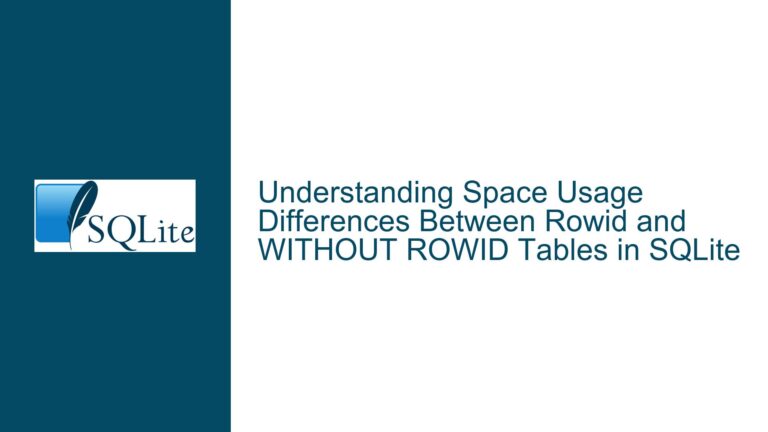Implementing UUIDs and Unique Identifiers in SQLite: Schema Design and Data Insertion Challenges
Understanding SQLite’s Lack of Native UNIQUEIDENTIFIER Support and Workarounds
SQLite does not natively support the UNIQUEIDENTIFIER column type, which is specific to Microsoft SQL Server. However, developers often need to replicate similar functionality for UUIDs (Universally Unique Identifiers) or other unique identifiers in SQLite. This guide explores the technical nuances of this limitation, the root causes of common implementation errors, and actionable solutions.
Root Causes of UUID/UniqueIdentifier Implementation Failures
1. Type Affinity Misunderstanding in SQLite
SQLite uses a dynamic type system with type affinity, where columns can store any data type regardless of their declared affinity. For example, declaring a column as UNIQUEIDENTIFIER (a non-native type) will not raise an error but will default to NUMERIC or TEXT affinity. This leads to confusion when developers expect strict type enforcement or automatic UUID generation akin to SQL Server.
2. Incorrect Default Value Strategies for UUID Generation
Attempts to auto-generate UUIDs using randomblob(16) or similar functions often fail because:
randomblob(16)produces a 16-byte BLOB but does not conform to UUIDv4 standards (missing version/variant bits).- Tools like SQLite DB Browser may display BLOBs as generic "BLOB" instead of hex strings, causing misinterpretation.
- Insertion logic might omit UUID generation, leading to
NULLvalues if the column lacks aDEFAULTclause.
3. Schema Portability Issues from SQL Server to SQLite
Schemas ported from SQL Server often include non-SQLite types like uniqueidentifier, nvarchar, datetime, or bit. SQLite ignores unrecognized type names, leading to silent schema mismatches. For example:
CREATE TABLE tbl_WorkTime (
[UniqueID] uniqueidentifier NOT NULL -- SQLite treats this as NUMERIC affinity
);
This column will accept integers or text, not UUIDs, unless explicitly constrained.
Comprehensive Solutions for UUID Management in SQLite
1. Schema Design: Choosing the Right Data Type
Option A: BLOB for Compact UUID Storage
Use a BLOB column to store 16-byte UUIDs. This is space-efficient and aligns with binary UUID representations:
CREATE TABLE tbl (
id BLOB PRIMARY KEY DEFAULT (uuid4_blob()) -- Requires extension (see Section 3)
);
Option B: TEXT for Human-Readable UUIDs
Store UUIDs as 36-character strings (e.g., 'a0eebc99-9c0b-4ef8-bb6d-6bb9bd380a11'):
CREATE TABLE tbl (
id TEXT PRIMARY KEY DEFAULT (uuid4_text())
);
Option C: Integer Primary Key for Simplicity
If uniqueness is the only requirement, use INTEGER PRIMARY KEY for auto-incrementing values:
CREATE TABLE tbl (
id INTEGER PRIMARY KEY, -- Auto-increments, no UUID
...
);
2. Generating Standards-Compliant UUIDs
a. Using the SQLite UUID Extension
Compile the uuid.c extension to generate UUIDv4:
-- Load extension (example for Linux)
.load ./uuid
-- Generate UUID as TEXT
INSERT INTO tbl (id) VALUES (uuid4());
-- Generate UUID as BLOB
INSERT INTO tbl (id) VALUES (uuid4_blob());
b. Custom UUID Generation in Application Code
Generate UUIDs in your application layer (e.g., Python):
import uuid
uuid_val = str(uuid.uuid4()) # TEXT
uuid_blob = uuid.uuid4().bytes # BLOB
c. Fixing randomblob(16) for UUIDv4 Compliance
Adjust the 6th and 8th bytes to set version/variant bits:
INSERT INTO tbl (id) VALUES (
randomblob(16) |
CAST(X'40' AS BLOB) << 8 | -- Set version 4
CAST(X'80' AS BLOB) << 12 -- Set variant 1
);
3. Schema Migration Adjustments
Revise SQL Server-specific column types to SQLite-compatible ones:
-- Original (invalid in SQLite)
CREATE TABLE tbl_WorkTime (
[UniqueID] uniqueidentifier NOT NULL,
[Work_Date] datetime NULL
);
-- Corrected
CREATE TABLE tbl_WorkTime (
[UniqueID] TEXT NOT NULL CHECK (length(UniqueID) = 36), -- Enforce UUID format
[Work_Date] TEXT -- ISO-8601 string (e.g., '2023-04-06T10:00:00Z')
);
4. Insertion Logic and Default Constraints
Explicitly generate UUIDs during insertion if not using DEFAULT:
-- Using application-generated UUID
INSERT INTO tbl_WorkTime (UniqueID, ...) VALUES ('a0eebc99-...', ...);
-- Using SQL-generated UUID (with extension)
INSERT INTO tbl_WorkTime (UniqueID, ...) VALUES (uuid4(), ...);
5. Tooling and Data Validation
- SQLite Shell: Use
.mode boxandhex()to inspect BLOBs:SELECT hex(id), typeof(id) FROM tbl; - SQLite DB Browser: Enable "Binary Display" mode to view BLOBs as hex.
- Application-Side Checks: Validate UUID format before insertion.
Common Pitfalls and Pro Tips
- Avoid Mixed UUID Formats: Consistently use TEXT or BLOB to prevent comparison errors.
- Indexing: UUIDs as PRIMARY KEYs or indexed columns work efficiently in SQLite, but BLOBs may offer slight performance gains over TEXT.
- Collations: Use
COLLATE BINARYfor case-sensitive UUID comparisons (default for BLOB).
By addressing SQLite’s type flexibility, UUID generation methods, and schema portability issues, developers can replicate UNIQUEIDENTIFIER functionality reliably.






